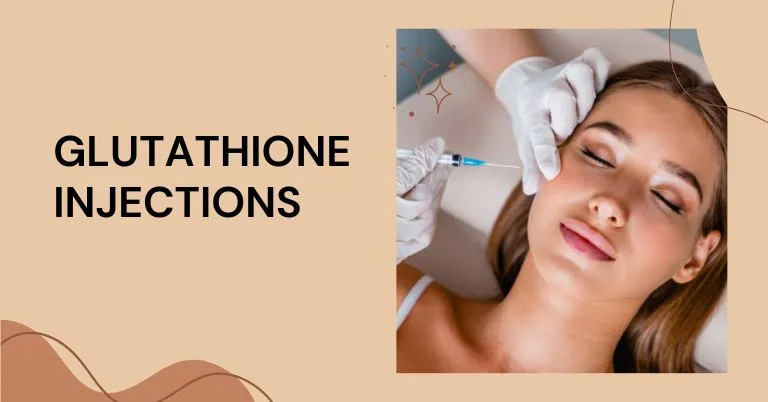Glutathione injections have become increasingly popular in recent years, especially among individuals seeking skin whitening, anti-aging benefits, and overall detoxification. Known as the “master antioxidant,” glutathione plays a vital role in neutralizing free radicals, boosting immunity, and supporting liver function. However, while the benefits are often highlighted in advertisements and social media posts, the potential side effects of glutathione injections are not discussed as openly.
Before starting any injectable treatment, it’s essential to understand both the advantages and the possible risks. In this article, we’ll explore the most common side effects of glutathione injections, why they happen, and what you can do to minimize your risks.
What Are Glutathione Injections?
Glutathione is a naturally occurring antioxidant found in almost every cell in the body. It is composed of three amino acids—cysteine, glutamine, and glycine—and plays a critical role in detoxifying the body, repairing cells, and supporting the immune system.
In injectable form, glutathione is often used for:
- Skin lightening or whitening
- Anti-aging treatments
- Liver health support
- General wellness and detox programs
Although glutathione is naturally produced in the body, injections deliver a concentrated dose directly into the bloodstream, making it more potent than oral supplements. However, this higher potency also means a higher potential for side effects.
Why Do Side Effects Occur?
Side effects from glutathione injections can arise for several reasons:
- High dosage levels
- Individual allergies or sensitivities
- Improper injection techniques
- Underlying health conditions
- Use of unregulated or low-quality products
Since glutathione injections are often administered for cosmetic purposes, they may be given without proper medical oversight in some cases, which increases the risk of complications.
Common Side Effects of Glutathione Injections
1. Mild Skin Reactions
One of the most common side effects is mild irritation at the injection site. This can include:
- Redness
- Itching
- Swelling
- Temporary pain or tenderness
These reactions are usually mild and resolve within a day or two. However, if redness spreads or the area becomes warm and painful, it could indicate an infection.
2. Allergic Reactions
Some individuals may develop allergic responses to glutathione or other components in the injection formula. Symptoms can include:
- Skin acne
- Hives
- Itching
- Swelling of the face, lips, or tongue
In rare cases, a severe allergic reaction known as anaphylaxis can occur, which requires immediate emergency medical attention.
3. Headaches and Dizziness
A sudden increase in glutathione levels can trigger mild headaches or dizziness, especially in first-time users. This may be linked to shifts in blood pressure or changes in blood circulation after the injection.
4. Nausea and Stomach Discomfort
Although glutathione is not directly injected into the stomach, some people experience gastrointestinal discomfort such as:
- Nausea
- Bloating
- Mild stomach cramps
These effects are often temporary and may be related to the body adjusting to the increased antioxidant levels.
5. Breathing Difficulties
In rare cases, glutathione injections can cause shortness of breath, wheezing, or chest tightness. This may happen due to an allergic reaction or sensitivity to the injection ingredients. People with asthma or respiratory issues should be particularly cautious.
6. Kidney and Liver Strain
While glutathione is generally considered safe for liver health, extremely high doses over a prolonged period may put extra strain on the kidneys and liver. This is because both organs work to process and filter the substance from the body. People with existing kidney or liver problems should only use glutathione injections under strict medical supervision.
7. Skin Whitening and Pigmentation Changes
For those seeking cosmetic whitening, this effect may be considered a benefit. However, in some cases, the changes can be uneven, leading to:
- Patchy skin tone
- Increased sensitivity to sunlight
- Hyperpigmentation rebound after stopping treatment
Uneven pigmentation can be distressing and difficult to reverse without additional dermatological treatments.
8. Potential Interaction with Other Medications
Glutathione injections can interact with certain medications, such as chemotherapy drugs or medications for autoimmune diseases. These interactions may either reduce the effectiveness of the medication or increase the risk of side effects.
How to Minimize the Risks
If you are considering glutathione injections, here are some tips to reduce your chances of experiencing side effects:
- Consult a qualified medical professional before starting treatment.
- Avoid unlicensed clinics or salons offering very cheap injections.
- Start with a lower dosage to see how your body reacts.
- Disclose any existing health conditions to your provider, especially related to the liver, kidneys, or immune system.
- Ask for product verification to ensure it’s from a reputable source.
- Monitor for any unusual symptoms and report them to your healthcare provider immediately.
When to Seek Medical Help
While mild side effects often resolve on their own, certain symptoms should not be ignored. Seek immediate medical attention if you experience:
- Difficulty breathing
- Swelling of the face or throat
- Severe rash or itching
- High fever or chills
- Persistent pain at the injection site
These could be signs of a severe allergic reaction or infection that requires urgent care.
Conclusion
Glutathione injections can offer cosmetic and wellness benefits, but they are not without risks. Side effects of glutathione injections can range from mild skin irritation to severe allergic reactions or organ strain. The best way to minimize these risks is to get injections from a qualified medical professional, use only high-quality products, and follow recommended dosage guidelines.
Before beginning any injectable treatment, it’s essential to weigh the potential benefits against the possible side effects and make an informed decision. Remember, your health and safety should always come first—cosmetic results are not worth compromising your well-being.
